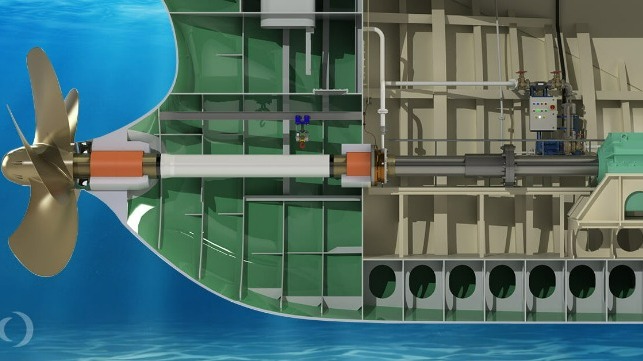Resistance to Change Preventing Move to Sustainable Shipping

[By: Thordon Bearings]
Ship owners, operators and managers responding to an environmental survey carried out by Canadian based McMaster University’s DeGroote School of Business have acknowledged the need to reduce operational oil leakage from propeller shafts. But a lack of understanding about cleaner alternatives is preventing any meaningful technological change.
Researchers questioned more than 1000 marine industry professionals last year to better understand why the majority of newbuild ships continue to be fitted with outdated oil lubricated propeller shafts when proven, cleaner technology is widely available.
Dr. Ken Deal, Professor of Marketing, DeGroote School of Business, McMaster University, said: “The DeGroote School of Business works closely with organizations to provide practical experiential learning for students. The survey, designed to better educate the shipping industry’s decision makers, provides a good example of how academia and business can work together to help different industries achieve their environmental goals.”
McMaster University, part of the U15 Group of Canadian Research Universities, identified a large gap in knowledge about seawater lubricated systems.
According to the findings, while 74% of the respondents believed “oil leaking from the stern tube negatively affects the environment”, responses indicated a lack of knowledge about the costs, benefits, reliability, technical equivalence, and performance realities of an open seawater lubricated propeller shaft bearing system.
Of all the 25 questions posed, the most telling indication as to why shipowners continue to specify oil-lubricated systems was gleaned from question six: “how important are the following factors when choosing an oil lubricated system over a seawater lubricated system for your fleet?”. Variations of “it works, so why change it,” made up the majority of answers.
Jeff Tennebaum, Marketing Manager, Thordon Bearings, who instigated the study, said: “Many of the respondents were not fully aware of the problem. They obviously care about the environment, but the results suggest they may not consider a stern tube oil leak to be a significant source of pollution.”
When participants were asked how much they agreed or disagreed with a series of statements relating to performance, there appeared to be a misconception that seawater lubricated propeller shafts were not as proven as oil lubricated systems. Respondents were unaware of the technical advancements seawater lubricated propeller shaft bearing systems have made over the years.
“The problem with seawater lubricated shafts is that we have to withdraw them every 5 to 6 years. If that is solved, then I would prefer them over the oil lubricated shaft,” said another respondent.
“This [oil lubrication] is the industry standard”. “Mostly due to what's offered by the yard”. “It was never proposed by any newbuilding shipyard”. “Shipyards are reluctant to change to a water lubricated arrangement”, were just some of the survey responses.
Craig Carter, VP Business Development, Thordon Bearings, said: “An immediate increase in ship owners demanding water lubricated systems would slowly pivot the direction of the global shipping industry towards a much more environmentally sustainable, zero pollution future; one that’s in line with the United Nations Sustainable Development Goal #14 and with the IMO’s World Maritime Theme for 2022 - New technologies for greener shipping.
“We are disappointed, of course, that the ‘if it works, why change it’ mentality persists but we will address these issues through a series of educational videos, seminars and workshops.
“It is absolutely crucial that Thordon Bearings and other manufacturers continue to educate the industry about the advantages of an open seawater lubricated system as way of meeting sustainability targets, but regulatory authorities also have an important role to play.”
The products and services herein described in this press release are not endorsed by The Maritime Executive.
